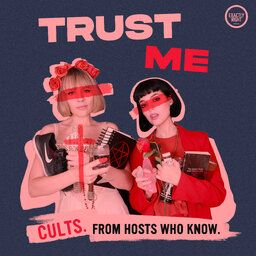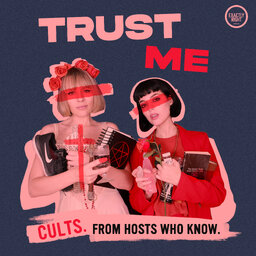Former members of the Two by Twos Kyle and Kari (the group that our Meagan grew up in) discuss the apocalyptic focus on the religion, personal stories of deconstructing their beliefs, the peculiar structure of the group led by pairs of ministers called "workers", how Kyle and Kari joined and met as kids, how it compared to Meagan's experience, what they did (and didn't) believe growing up, how the pandemic led them to question their beliefs, and how they found their way back to each other after a difficult period of disconnection. Stay tuned next week to learn about the Facebook they created for former members and the devastating news that came to light.
Trust Me is brought to you by Progressive! Quote today at Progressive.com to try the Name Your Price® tool for yourself, and join the over 29 million drivers who trust Progressive!
Got your own story about cults, extreme belief, or abuse of power? Leave a voicemail or text us at 347-86-TRUST (347-868-7878) OR shoot us an email at TrustMePod@gmail.com
CHECK OUT OUR MERCH!! bit.ly/trustmemerch
INSTAGRAM:
@TrustMePodcast
@oohlalola
@meaganelizabeth11
TWITTER:
@TrustMeCultPod
@ohlalola
@baberahamhicks
TIKTOK:
@TrustMeCultPodcast
In 1 playlist(s)
Trust Me: Cults, Extreme Belief, and Manipulation
Trust Me is a weekly interview podcast about cults, extreme belief, and the fine line between devoti…Social links
Follow podcast
Recent clips

Martina Castro, Part 2 - Allegations, Disappearances, and the Crumbling Cult of John of God
52:21

Martina Castro, Part 1 - Psychic Surgeries & John of God's Spiritual Celebrity
49:32

Parvati Shallow - From Surviving a Cult to Winning Survivor
52:58
 Trust Me: Cults, Extreme Belief, and Manipulation
Trust Me: Cults, Extreme Belief, and Manipulation